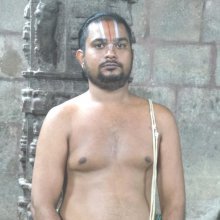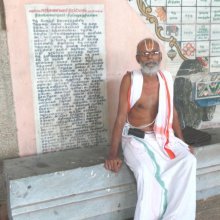Vaikunta: 2 definitions
Introduction:
Vaikunta means something in Hinduism, Sanskrit. If you want to know the exact meaning, history, etymology or English translation of this term then check out the descriptions on this page. Add your comment or reference to a book if you want to contribute to this summary article.
Images (photo gallery)
In Hinduism
Purana and Itihasa (epic history)
Source: Shodhganga: Temples and cult of Sri Rama in TamilnaduVaikunta is short for Vaikuntavinnakaram, which refers to one of the 108 divyadesas according to Priyavaccan Pillai’s compendium of the Ramayana based on the Nalayirativviyappirapantam.—Vaikunta-vinnakaram is the venue of the Lord Vaikunthamurti who is supposed to be present in Vaikuntha. The Vaikuntha Perumal Temple at Kanchi is known as Parameccura-Vinnakaaram (infra). By immortal tradition, the Lord in the Vaikuntha is either seated or reclining.

The Purana (पुराण, purāṇas) refers to Sanskrit literature preserving ancient India’s vast cultural history, including historical legends, religious ceremonies, various arts and sciences. The eighteen mahapuranas total over 400,000 shlokas (metrical couplets) and date to at least several centuries BCE.
General definition (in Hinduism)
Source: Apam Napat: Indian MythologyVishnu's abode is Vaikunta, whose entrance is guarded by the two Gandharvas Jaya and Vijaya. Here, Vishnu is sleeping on the body of an enormous thousand-headed serpent called Adisesha. The serpent is floating in a sea of milk. Vishnu's wife Laxmi is by his side, pressing his feet and lulling him to sleep.
See also (Relevant definitions)
Starts with: Vaikuntam, Vaikuntan, Vaikuntanatan, Vaikuntaperumal, Vaikuntavaci, Vaikuntavinnakaram.
Full-text: Vaikuntanatan, Uchaishravas, Adisesha, Kalpatharu, Vishnu, Amrita, Vaikuntha Ekadashi, Svarga, Ashwini.
Relevant text
Search found 7 books and stories containing Vaikunta; (plurals include: Vaikuntas). You can also click to the full overview containing English textual excerpts. Below are direct links for the most relevant articles:
Tiruvaymoli (Thiruvaimozhi): English translation (by S. Satyamurthi Ayyangar)
Section 6 - Sixth Tiruvaymoli (Vaikunta Manivannane) < [Book 2 - Second Centum]
Pasuram 4.10.11 < [Section 10 - Tenth Tiruvaymoli (Onrum-tevum, ulakum)]
Pasuram 7.9.7 < [Section 9 - Ninth Tiruvaymoli (Enraikkum)]
Temples in and around Madurantakam (by B. Mekala)
Sri Varadarajaswamy Temple < [Chapter 3 - Temples of Madurantakam Taluk]
The Religion and Philosophy of Tevaram (Thevaram) (by M. A. Dorai Rangaswamy)
Chapter 97 - Thirunodithanmalai or Tirunotittanmalai (Hymn 100) < [Volume 3.7 - Unto the last]
Chapter 3.5 - Jalandharasura-murti (the conquest of Jalandhara Asura) < [Volume 2 - Nampi Arurar and Mythology]
Chapter 87 - Thiruchuzhial or Tirucculiyal (Hymn 82) < [Volume 3.7 - Unto the last]
Namasmarana - A Universal Sadhana (by Narayana Kasturi)
Harivamsha Purana (by Manmatha Nath Dutt)
Chapter 42 - Vishnu’s Appearance < [Book 1 - Harivamsa Parva]

